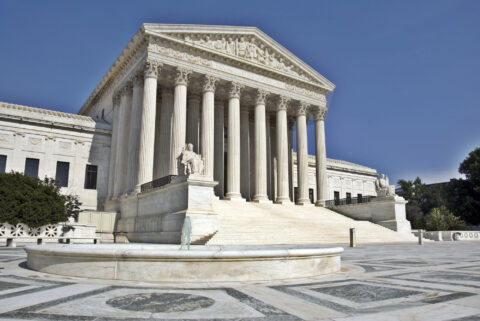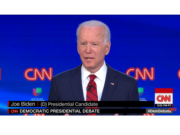The Daily Beast recently marked the six year anniversary of Citizens United by carrying on one of the decision’s most prominent legacies: spurring members of the media to embarrass themselves by failing to grasp even the most basic aspects of the ruling.
Jay Michaelson, “a writer and LGBT activist in the USA who writes on spirituality, Judaism, sexuality, and law” according to his Wikipedia page, turned his expert eye to the case in an article titled, “How Citizens United Gave Us Bernie Sanders and Donald Trump.”
Oh, boy. Let’s make some corrections.
1) “There would be no Donald Trump or Bernie Sanders boom without Citizens United.”
This is the first sentence in the article and it’s completely off the mark. Populist candidates are not a new phenomenon, and only the most tortured readings of Trump’s stump speeches could bring one to believe that his supporters care more about campaign finance than about immigration or trade with China. If there’s a lesson to be learned from Trump’s popularity in the polls, it’s that his advantages over other candidates – his personal wealth, his celebrity, and his masterful manipulations of the American media – make the case for lifting campaign finance restrictions so that other candidates without his fame and access can compete on even footing.
Sanders, for his part, is not exactly breaking new ground by running to the left of Hillary Clinton in a Democratic primary. President Obama did the same thing to great success in 2008, years before Citizens United was decided.
2) “The infamous Supreme Court case, decided six years ago today, banned limits on corporate spending in elections.”
Citizens United allowed corporations to spend money independently of candidates, but the ban on corporations giving money to candidates remains law. To say there are no limits on corporate spending in elections is mistaken because business entities can’t spend money on contributions to candidates. It also should be noted that Citizens United applies to unions as well as corporations, but Michaelson omits this fact throughout his article.
3) “[Super PAC] money has heavily favored establishment candidates, even keeping some alive when they would otherwise be dead (like Jeb Bush).”
Tell that to Rick Perry and Scott Walker. Virtually every close observer of the 2016 election has concluded that a campaign cannot survive with the independent support of super PACs alone. Bush, in addition to having the support of a super PAC, has more endorsements than any other candidate in the Republican Primary and high name recognition because his brother and father were both President.
Given these advantages, it’s not fair to say that super PACs are keeping Bush’s candidacy alive. If anything, they are demonstrating how little super PACs can achieve if voters aren’t interested in a candidate’s message. Even with these advantages, voters – at least based on polling – seem to be making up their own mind: they’re not buying the Bush message. Besides, do we really want candidates dropping out before a single vote has been cast in a primary or caucus? For years, “reformers” complained that fundraising was forcing candidates out of races before voters had their say. Has their position changed?
4) “Citizens United didn’t just unleash corporate spending; it enabled the creation of a whole new vehicle for influencing elections: super PACs.”
This is a common misconception and it probably isn’t that important, but for accuracy’s sake, it was technically a different 2010 case, SpeechNow.org v. FEC, that created super PACs. Citizens United (CU) was about whether a corporation could air and advertise a documentary critical of a political candidate near an election. The Court’s ruling in CU paved the way for SpeechNow, but it did not directly create super PACs, and had the Court ruled against CU, it still likely would have sided with the petitioners in SpeechNow.
5) “These pseudo-corporations don’t have to disclose their donors and can spend unlimited amounts on elections, as long as they’re not officially coordinating with specific candidates (which has turned out to be a joke).”
Here’s a doozy of an error. Six years later, there’s no excuse for still believing that Citizens United allowed undisclosed contributions to super PACs. It unequivocally did not. Citizens United did not affect disclosure law in any way. Furthermore, super PACs are required to disclose all of their contributors who give over $200 (the same threshold that applies to candidates and PACs). In other words, we know the same information about super PAC donors that we know about every political donor since the 1970s.
On the coordination point, Michaelson’s casual dismissal of current law ignores the reality that investigations into alleged coordination are some of the most invasive in campaign finance, often requiring regulators to pour over private, internal communications. As we learned from the debacle in Wisconsin, coordination investigations can be easily abused by the government to harass political opponents. We should approach them with caution.
6) “Once the floodgates were opened, super PACs deluged local and national elections with money.”
Michaelson asserts that CU led to a massive increase in super PAC spending in local elections, but he provides no data to back the claim, and he’s missing some key context: in over half of the 50 states, what are now called ‘super PACs’ were already legal prior to Citizens United. So for over half the country, CU had literally no effect on local elections.
7) “The radical change in campaign financing has radically increased the power of the most powerful, contributing to the alienation of everyone else.”
This view is hard to square with reality. The “most powerful” Michaelson references presumably includes many of the wealthy, well-connected Republican donors backing Jeb Bush, who just happens to be languishing in the polls. The “most powerful” presumably included Eric Cantor, who was House Majority Leader and Congress’s second-best fundraiser prior to losing a primary election to an opponent he outspent 26-to-1. The “most powerful” presumably includes big spending billionaires like environmentalist Tom Steyer and gun control advocate Michael Bloomberg, who have achieved virtually no desired policy changes for their spending. Ditto for Sheldon and Miriam Adelson in 2012. (How is President Gingrich doing, by the way?) And in this cycle, we hear repeatedly that the supposedly all-mighty Koch brothers can’t find a single candidate to their liking.
Sure, these citizens are spending more money as a result of Citizens United, but ask yourself: what are they getting for it? Since 2010, America has seen the legalization of gay marriage, the passage of the biggest banking regulation bill ever, and the establishment of the highest corporate tax rate in the world – all under the leadership of the first African American president who overwhelmingly won re-election. Is that really the alienation of “everyone else” for the benefit of the “most powerful”?
8) “In 2012, almost $320 million was spent without disclosure of donors. Only 40 percent of “outside spending” was disclosed in 2012, down from almost 100 percent in 2004. This isn’t just big money: it’s big, dark money.”
First of all, the spending Michaelson cites is from advocacy nonprofits, not super PACs, which disclose their donors. Second, $320 million sounds like a lot of money, but it’s a drop in the bucket in comparison to the $7.3 billion that was spent on the 2012 election, according to the Federal Election Commission. This “big, dark money” Michaelson is fretting about accounted for a measly 4.3% of political spending in the 2012 cycle. In 2014, it was an even smaller slice – 3.9%. With disclosure for over 95% of the money spent on campaigns, we should ask how far we’re willing to go to chase that final 5%. Eliminating all undisclosed spending, like eliminating all crime or all pollution, is an unrealistic goal and one that could cause us to unwisely sacrifice other important democratic values.
* * *
The day we reach a consensus on Citizens United may never arrive, but readers that wish to consider its legacy deserve better than the misrepresentations of the decision’s detractors. Sadly, six years of inaccurate media coverage and commentary suggest that Americans are unlikely to receive fair discussion of the decision any time soon.














